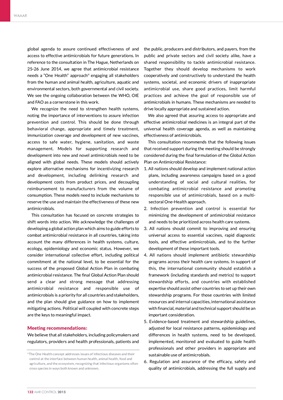
global agenda to assure continued effectiveness of and
access to effective antimicrobials for future generations. In
reference to the consultation in The Hague, Netherlands on
25-26 June 2014, we agree that antimicrobial resistance
needs a "One Health" approachiii engaging all stakeholders
from the human and animal health, agriculture, aquatic and
environmental sectors, both governmental and civil society.
We see the ongoing collaboration between the WHO, OIE
and FAO as a cornerstone in this work.
We recognize the need to strengthen health systems,
noting the importance of interventions to assure infection
prevention and control. This should be done through
behavioral change, appropriate and timely treatment,
immunization coverage and development of new vaccines,
access to safe water, hygiene, sanitation, and waste
management. Models for supporting research and
development into new and novel antimicrobials need to be
aligned with global needs. These models should actively
explore alternative mechanisms for incentivizing research
and development, including delinking research and
development costs from product prices, and decoupling
reimbursement to manufacturers from the volume of
consumption. These models need to include mechanisms to
reserve the use and maintain the effectiveness of these new
antimicrobials.
This consultation has focused on concrete strategies to
shift words into action. We acknowledge the challenges of
developing a global action plan which aims to guide efforts to
combat antimicrobial resistance in all countries, taking into
account the many differences in health systems, culture,
ecology, epidemiology and economic status. However, we
consider international collective effort, including political
commitment at the national level, to be essential for the
success of the proposed Global Action Plan in combating
antimicrobial resistance. The final Global Action Plan should
send a clear and strong message that addressing
antimicrobial resistance and responsible use of
antimicrobials is a priority for all countries and stakeholders,
and the plan should give guidance on how to implement
mitigating actions. Political will coupled with concrete steps
are the keys to meaningful impact.
Meeting recommendations:
We believe that all stakeholders, including policymakers and
regulators, providers and health professionals, patients and
the public, producers and distributors, and payers, from the
public and private sectors and civil society alike, have a
shared responsibility to tackle antimicrobial resistance.
Together they should develop mechanisms to work
cooperatively and constructively to understand the health
systems, societal, and economic drivers of inappropriate
antimicrobial use, share good practices, limit harmful
practices and achieve the goal of responsible use of
antimicrobials in humans. These mechanisms are needed to
drive locally appropriate and sustained action.
We also agreed that assuring access to appropriate and
effective antimicrobial medicines is an integral part of the
universal health coverage agenda, as well as maintaining
effectiveness of antimicrobials.
This consultation recommends that the following issues
that received support during the meeting should be strongly
considered during the final formulation of the Global Action
Plan on Antimicrobial Resistance:
1. All nations should develop and implement national action
plans, including awareness campaigns based on a good
understanding of social and cultural realities, for
combating antimicrobial resistance and promoting
responsible use of antimicrobials, based on a multisectoral
One-Health approach.
2. Infection prevention and control is essential for
minimizing the development of antimicrobial resistance
and needs to be prioritized across health care systems.
3. All nations should commit to improving and ensuring
universal access to essential vaccines, rapid diagnostic
tools, and effective antimicrobials, and to the further
development of these important tools.
4. All nations should implement antibiotic stewardship
programs across their health care systems. In support of
this, the international community should establish a
framework (including standards and metrics) to support
stewardship efforts, and countries with established
expertise should assist other countries to set up their own
stewardship programs. For those countries with limited
resources and internal capacities, international assistance
with financial, material and technical support should be an
important consideration.
5. Evidence-based treatment and stewardship guidelines,
adjusted for local resistance patterns, epidemiology and
differences in health systems, need to be developed,
implemented, monitored and evaluated to guide health
professionals and other providers in appropriate and
sustainable use of antimicrobials.
6. Regulation and assurance of the efficacy, safety and
quality of antimicrobials, addressing the full supply and
WAAAR132 AMR CONTROL 2015
iii The One Health concept addresses issues of infectious diseases and their
control at the interface between human health, animal health, food and
agriculture, and the ecosystem, recognizing that infectious organisms often
cross species in ways both known and unknown.